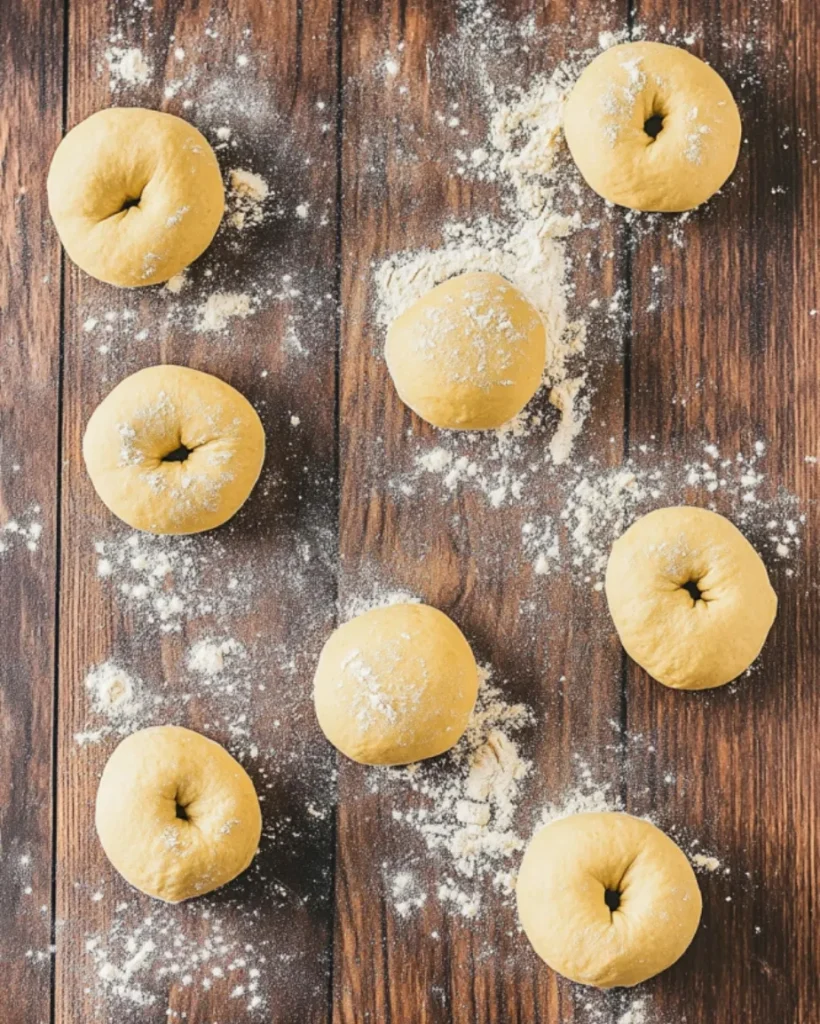The first time I pulled a batch of homemade egg bagels from the oven, they looked and smelled amazing. Their golden color and aroma made my kitchen feel like a real bakery. Unlike regular bagels, these egg bagels are soft and luxurious, making any meal special.
Egg bagels are more than just a recipe. They’re a journey into a world of comfort and skill. Whether you’re a seasoned baker or just starting out, these golden treats offer a unique twist. They make your bread more flavorful and stand out from the usual bagels.
Key Takeaways
- Egg bagels offer a richer flavor profile compared to traditional bagels
- Perfect for breakfast, brunch, or gourmet sandwiches
- Simple to make with the right technique and ingredients
- Provides a more tender and soft texture than standard bagels
- Nutritionally enhanced due to egg content
What Makes Egg Bagels Different from Regular Bagels
Exploring bagels shows us how egg bagels differ from the usual ones. Knowing these differences can change how we enjoy breakfast and see food. Egg bagels stand out with their special qualities, making them a unique breakfast choice.
The Role of Eggs in Bagel Making
Eggs are key in making egg bagels different. They add to the dough, making the bagels:
- Richer in flavor
- Higher in protein
- Softer and more tender
Texture and Flavor Characteristics
Egg bagels have a softer inside and a richer look than regular ones. They taste sweeter and deeper. Bakers love how eggs bring out a richer taste.
Nutritional Differences
Looking at nutrition, egg bagels have some key differences. They offer:
- More protein
- More vitamins and minerals
- A bit more calories
These differences make egg bagels a great choice for a nutritious breakfast.

The History and Origins of Egg Bagels
The story of egg bagels starts in the rich history of traditional Jewish bread. They came from the Jewish communities of Poland in the 16th century. Bagels quickly became a key part of their culture. Egg bagels added a special touch to the classic round bread that changed bakery traditions.
Bagels have their roots in Eastern European Jewish communities. They were important in their culture. The egg bagel was a fancy version of the traditional bagel, with a richer taste and softer texture. Families made these special breads for holidays and big celebrations, making the bagel a festive treat.
- 16th-century Polish Jewish communities first developed bagel recipes
- Egg bagels represented a premium variation of traditional bagels
- Cultural celebrations often featured these enriched breads
Jewish immigrants brought their egg bagel history to American cities like New York. Bakeries started making softer, golden bagels that more people liked. The New World welcomed these tasty breads, making them a favorite for breakfast.
Today, egg bagels keep their traditional roots while fitting into today’s tastes. Bakers and home cooks love the history behind these beloved breads. They make sure egg bagels stay vibrant and tasty.
Essential Ingredients for Perfect Egg Bagels
Making delicious egg bagels starts with the right ingredients. The key to a great bagel is using high-quality parts. These parts work together to create a tasty treat.
Choosing the Right Flour
Choosing the perfect flour is key for egg bagels. High-gluten flour is the best for a chewy texture. It has more protein, making bagels dense and chewy.
- Protein content: 12-14% for ideal bagel texture
- Recommended brands: King Arthur and Gold Medal bread flour
- Avoid all-purpose flour for best results
Egg Quality Matters
The eggs you pick affect your bagel’s taste and look. Use fresh, large eggs with bright yellow yolks. Eggs from free-range chickens taste richer and look deeper.
Essential Additional Ingredients
Yeast is crucial for the perfect rise and texture in bagels. Professional bakers suggest using:
- Active dry yeast
- Instant yeast
- Fresh compressed yeast
Each yeast type adds its own twist to the dough. It changes the rise and flavor of your bagels.
Pro tip: Always check the expiration date on your yeast to ensure maximum rising power!
Step-by-Step Egg Bagel Making Process
Making egg bagels at home needs focus and some key steps. Start with a perfect dough. This dough is the base for your tasty bagels.



Kneading the dough is key. Mix your ingredients until they form a smooth, elastic dough. Knead for 10 minutes by hand or with a stand mixer. The dough should feel firm but still soft.
- Prepare your work surface with a light dusting of flour
- Knead the dough using consistent, firm movements
- Check for smooth, elastic consistency
Let the dough rest and rise after kneading. Divide it into equal parts and shape each into a ball. Make the bagel shape by poking a hole in the center and stretching it.
Boiling the bagels is important for their chewy outside. Boil a large pot of water with a tablespoon of honey or barley malt syrup. Gently add each bagel to the water and boil for 1 minute on each side.
To bake the bagels, preheat your oven to 425°F. Place the boiled bagels on a parchment-lined baking sheet. Brush with an egg wash and add toppings like sesame seeds or everything bagel seasoning.
- Bake for 20-25 minutes
- Look for a golden-brown crust
- Allow bagels to cool on a wire rack
Your homemade egg bagels are now ready to enjoy!
Common Mistakes to Avoid When Making Egg Bagels
Making the perfect egg bagel needs skill and focus. Even skilled bakers face challenges. Knowing common mistakes helps make delicious, top-notch bagels every time.
Navigating Dough Consistency Challenges
Bagel troubleshooting starts with mastering bagel dough texture. Wrong mixing can cause big problems. Here are common dough issues to watch out for:
- Undermixing: Leads to uneven texture and weak gluten
- Overmixing: Makes bagels tough and dense
- Wrong hydration levels harm dough’s elasticity
Boiling and Baking Precision
Overproofing can ruin your hard work. Learn to spot overproofed dough signs:
- Dough gets very puffy and loses shape
- Surface looks wrinkled and deflated
- Bagels spread out instead of staying tall
Maintaining Bagel Freshness
Storing bagels right is key for keeping flavor and texture. Here’s how to keep your egg bagels fresh:
“Fresh bagels are a delicate treasure – handle them with care!”
- Cool completely before storing
- Use airtight containers
- Refrigerate or freeze within 24 hours
- Reheat gently to restore original texture
By mastering these techniques, your egg bagel baking will go from unpredictable to consistently great. Remember, practice makes perfect!
Serving Suggestions and Pairing Ideas
Egg bagels are perfect for bagel toppings that make breakfast or lunch special. Try classic cream cheese flavors with egg bagels. Gourmet bagel spreads can make your meal unforgettable.
For savory bagel sandwiches, here are some tasty ideas:
- Smoked salmon with dill cream cheese
- Classic turkey and avocado
- Mediterranean-inspired hummus and roasted vegetables
- Bacon, egg, and cheese classic breakfast sandwich
Sweet lovers can enjoy egg bagels with creamy spreads. Try strawberry cream cheese, Nutella, or almond butter. Your bagel can be a sweet treat any time of day.
Drinks can make your egg bagel even better. Pair it with strong coffee, fresh orange juice, or a creamy latte. For a lighter choice, a green smoothie or herbal tea pairs well with bagel toppings.

Pro tip: Create a bagel bar for brunches, allowing guests to customize their own egg bagel masterpieces!
Conclusion
Making homemade egg bagels is more than a baking project. It’s a journey that connects you to a rich bread-making tradition. You’ve learned skills and tips that let you turn simple ingredients into delicious artisanal bread.
Your knowledge about egg selection, dough preparation, and baking techniques opens up a world of tasty possibilities. Whether you’re new to baking or have experience, mastering egg bagels lets you make restaurant-quality bread at home. Each batch is a chance to improve your skills and create your own unique flavors.
Remember, making perfect homemade egg bagels takes time and practice. Don’t get discouraged by early tries—each one teaches you something new. Try different ingredients, share your creations, and enjoy the journey of becoming a skilled artisan baker. Your adventure with egg bagels is just starting, and the best is yet to come.
Embrace the art of bread making and let your love for homemade egg bagels guide you. With patience, practice, and creativity, you’ll soon make extraordinary artisanal bread that wows everyone who tries it.
FAQ
What makes egg bagels different from traditional bagels?
Egg bagels have eggs in the dough, making them softer and richer. They also have a golden color. The eggs add sweetness and a tender crumb.
Are egg bagels more nutritious than regular bagels?
Yes, egg bagels have more protein and vitamins like D and B12. They are a bit healthier than regular bagels.
Can I freeze homemade egg bagels?
Yes, you can freeze them for up to 3 months. Wrap each bagel in plastic or foil, then in a freezer bag. Thaw at room temperature or toast from frozen.
What type of flour works best for egg bagels?
Use high-protein bread flour, with 12-14% protein. It gives the perfect chewy texture and structure.
How long does it take to make egg bagels from scratch?
It takes 3-4 hours, including prep, rising, shaping, boiling, and baking. Hands-on time is about 1 hour, with the rest for proofing and resting.
Can I make egg bagels without eggs if I have an allergy?
If you’re allergic to eggs, use ground flaxseed, mashed banana, or egg replacers. But, it won’t be the same as traditional egg bagels.
What are the best toppings for egg bagels?
Egg bagels go well with sweet and savory toppings. Try cream cheese, smoked salmon, or honey. For sweetness, use jam or cinnamon sugar.
How do I know when egg bagels are properly baked?
They should be golden-brown and sound hollow when tapped. The internal temperature should be 190-200°F. They should feel light and crisp.
Are egg bagels considered a Jewish traditional food?
Yes, they have deep roots in Jewish cuisine, especially in Ashkenazi Jewish traditions. They’re a favorite for breakfast and brunch in Jewish bakeries.
How should I store homemade egg bagels to maintain freshness?
Keep them in an airtight container or sealed bag at room temperature for 2-3 days. Refrigerate for up to a week or freeze for 3 months to keep them fresh.

